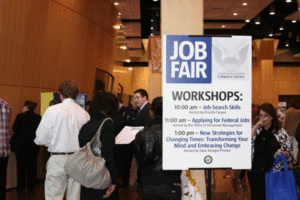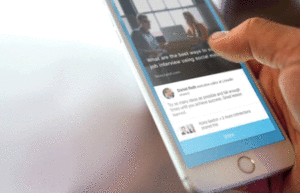Jobs 101
Published on March 8, 2017, at 8:40 a.m.
by Josie Seavers and Meredith Folsom.
If you are a junior or senior public relations student, you have probably taken all your required general education classes by now, so you feel ready — or generally ready. But, it’s now time to start applying to internships or post-grad jobs. You are suddenly asking yourself, why there was never a required Jobs 101 class? Welcome to a crash course for one of the most important aspects to finding a job: developing connections and following up.

Develop connections:
Before you get on the computer and start searching through the thousands of PR-related jobs listed on numerous sites, think about your connections. If you are reading this article, it is clear that you care about your major.
You have probably networked with many professors, mentors and even peers who have potential job opportunities. The bigger the connection pool the greater opportunity you have for finding a job.
“Every job I’ve had was because of a connection,” Jolene Peixoto, director of corporate communications at JDA Software, said. “You have to work on keeping in touch with people that are important.”
When asked about how a student should build connections, Marc E. Oppenheim, senior associate dean at The Lawrence Herbert School of Communication and founder and editor of MEO jobs, said, “Students have been committing themselves to their universities. It’s important to know that your faculty, your advisers and other support professionals are there. Express to them where you are in the job search process. Make it clear you want their advice and guidance.”
Oppenheim considers professors as your first go-to when building your connection pool.

“Professors at your school are ‘low hanging fruit,’” Oppenheim explained. “They have seen you succeed and are more likely to advocate for you because of that. You have to be the pinball in the pinball machine. You, the job seeker, need to bounce off as many people as possible.”
Once you have applied to a job, you should let your connection at that desired company know. You would be surprised how much he or she can help you.
“Reach out to your connection,” Peixoto said. “A lot of companies give referral bonuses so that could be more of an incentive for your connection to help you through the process.”
Follow up:
After you have submitted your application, it is important to further demonstrate your interest in the job with a follow-up.
“Always follow up,” said Amy Bramlett, manager of student services and outreach at The University of Alabama’s Career Center. “Only 10 percent of people are reaching back out in any way; it kind of sets you above and beyond.”
As LinkedIn continues to grow as a popular resource among job seekers and employers, knowing which methods are the most efficient and appropriate for follow-ups has become unclear for many applicants.

“If you can find somebody on LinkedIn to give you some sort of introduction through InMail that is acceptable,” said Bramlett. “Anytime you can get a forward or an introduction, that is ideal.”
However, it is often the “out-of-style” method that is the most effective.
“The best thing is to call; it is much harder to ignore a voicemail than an email,” Bramlett said.
When it comes to dialogue, Bramlett suggested keeping it simple by informing the employer you have submitted your application and that you would like the opportunity to speak to him or her.
Persistence is key when applying for an internship or post-grad job, especially in a competitive and fast-paced industry like PR; but the fear of being too persistent can have you questioning yourself on when and how often to follow up.
“Follow up within the week if they did not give you a deadline,” Bramlett said when asked how long you should wait before reaching out to an employer. “After that, I would never follow up more than once a week. If you have the time and know you are not able to get hired until May, almost every other week would be the best etiquette.”
The application process can be stressful; but by taking the time to build connections and to reach out to employers in the industry, you can become one step closer to landing the job.




